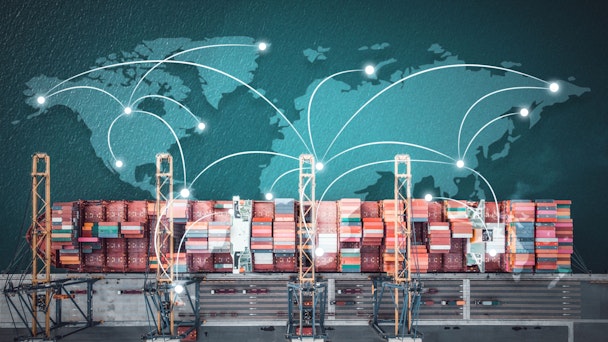How leading brands are tackling the era of new globalization
Speed, artificial intelligence (AI), automation, digitization, sustainability, social capitalism and resilient supply chains will be fundamental to help brands and business thrive as we enter the era of ‘new globalization,’ according to a panel of cross-border decision makers from leading brands including Mars Inc, Fujitsu America, Kwontified and Economist Impact.

A panel of experts to explore what ‘new globalization’ means for marketers
The Drum, together with Economist Impact – a new business within The Economist Group that combines policy research expertise, innovative design and creative storytelling to drive change on pressing global issues – enlisted a panel of experts to explore what ‘new globalization’ means for marketers. They also offered insight and advice on how to futureproof marketing strategies to tackle the biggest challenges of tomorrow.
Setting the scene for the conversation, John Ferguson, practice lead – globalization, trade and finance at Economic Impact, spoke of three fundamental forces driving this new chapter for globalization: a fourth industrial revolution, geopolitics and the growing impact of climate change.
"All three things have happened before in history, but never really at the same time,” says Ferguson. “When we look toward the next 10 years, it’s going to be a period of great change. Go back 20 years when globalization was exploding, supply chains were exploding, and companies in Europe and the US, for example, were going right across the world in search of new markets and new trading partners. All of that now is starting to unravel and raise questions around what this new chapter means for companies in terms of new strategies, markets and how they position themselves."
Think global, act local
For Praveen Moturu, vice-president and chief enterprise architect at Mars Inc, the disruption caused by Covid-19 has forced his company to look at globalization differently. He says: “We have completely changed our perspective on globalization, not in terms of the foundations because we’ve been driving the foundations for a long time, but more extra steps need to be taken in terms of digitalization coming into the picture and the pace of change, which has to be taken care of more carefully now than in the past because expectations are changing from the digital consumer and customer [and that impacts] how you’re defining your digital products and services.”
Moturu also touches on how AI and automation are driving the crux of globalization and will be “the fundamental cornerstones of any big solutions going forward and have to be built into the DNA.” He also speaks on the importance of understanding the security, privacy and compliance to ensure products and services delivered meet your promise to consumers and customers. The job for digital businesses now, he says, is to “think global but act local” and focus on local culture and values.
Echoing that view from an e-commerce perspective, Elaine Kwon, managing partner and co-founder at Kwontified, believes that new globalization can be measured by how quickly companies can develop a commerce initiative and make a global impact.
She says: “As we continue to see new globalization take effect, we will see the time that is required to do so shorten. It’s about taking a bigger step back and looking at what new globalization really means. It’s moving away from the import and export of physical goods to the import and export of culture, lifestyle and behavioral habits, and how that’s going to shift and influence trade within itself.”
New social capitalism
Building on that, Paul Bresnahan, head of manufacturing industry for Fujitsu America, adds that social media has allowed people to become very aware of these cultural movements. He says: “As they become very aware to it, it makes them question where they’re buying products from, where they’re sourcing product from and how that’s being put together. And they’re challenging those questions. We’re seeing this kind of new capitalism starting to form around social capitalism, where companies are having to take real note of these cultural trends – and it’s affecting the way they go to market. It’s affecting where they source their product and the relationship that they have with the end consumer, and it’s causing a lot of change and disruption.”
The experts go on to discuss why now, more than ever, brands need to understand consumer behavior on a continuous basis to really understand the problem and define their digital experiences from the customer point of view. They also touch on topics including sustainability and the closed feedback loop, and how to get the right balance between a ‘just in time’ and ‘just in case’ approach.
This panel was hosted as part of The Drum’s Globalization and the Marketing Business Deep Dive, sponsored by Economist Impact. Watch the full discussion above for the full insights.
Content created with:

Economist Impact
Economist Impact combines the rigour of a think-tank with the creativity of a media brand to engage a globally influential audience. We believe that evidence-based...
Find out more
